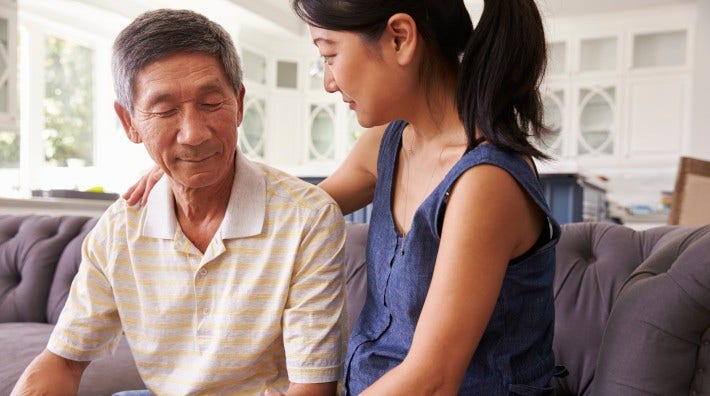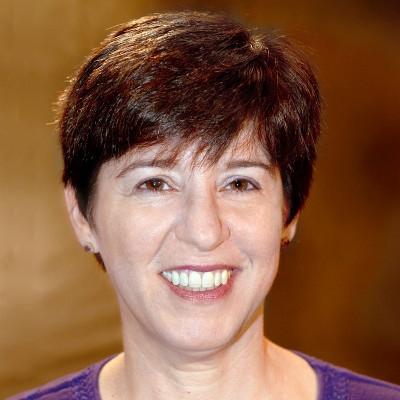FAQ: Caregiving During Radiation Treatment

Taking care of someone with cancer may involve learning some basics about radiation treatments. Radiation therapy is one of the most common treatments for some types of cancer. It may be used to cure a cancer or shrink tumors, stop cancer from coming back, or treat symptoms of cancer that has spread.
It’s normal to have questions about how to help someone getting radiation treatment. If you have questions after reading this article, talk to the cancer care team. You can also call our Cancer Helpline at 1-800-227-2345.
How does radiation treat cancer?
Radiation therapy uses high-energy waves to destroy or damage cancer cells. These waves may be x-rays, gamma rays, electron beams, or protons. Radiation works by breaking the DNA in cancer cells which helps keep them from growing and can cause them to die.
Most of the time, radiation is aimed at only the area that has cancer. It doesn’t reach the rest of the body. It also tends to do less damage to normal cells and tissues compared to chemotherapy and other treatments that travel throughout the body.
What kinds of radiation therapies are used to treat cancer?
- The most common type of radiation therapy is external beam radiation, which directs high-energy beams from a machine outside the body into the tumor.
- But some cancers are better treated with internal radiation, where an implant is put inside the body near the tumor.
- Another type is systemic radiation, when a radioactive drug is used and either given by mouth or put into a vein. External and internal radiation therapy mostly affect only the part of the body that has cancer while systemic radiation travels throughout the body.
What effects can radiation therapy have?
Side effects depend on the type of radiation being given, the type and location of cancer being treated, if there are other health problems, and if the patient is also getting another type of cancer treatment. Some people may have many side effects, while others may have very few. The most common side effects are skin problems and fatigue.
Fatigue means feeling very tired in the body and mind and is different from tiredness felt on a usual day. Usually, fatigue is not caused by treatment alone, but things like low blood counts, stress or emotions. It’s normal for patients to feel anxious, depressed, afraid, angry, frustrated, alone, or helpless. It can help to talk to other people going through the same thing. Ask the cancer care team or the American Cancer Society about in-person or online support groups.
The level of fatigue can also be affected by changes in how a patient eats and how much physical activity they may getting. Staying active while also getting enough rest and eating a healthy diet may help. Talk to the cancer care team about other ways to manage fatigue.
External beam radiation can make the skin in the area being treated look and feel like it’s been sunburned. It may hurt or itch, peel, or become flaky. Try to protect the area from rubbing or scratching. Tight or stiff clothes may bother the skin. Ask the cancer care team whether it’s OK before using anything on the skin, including soaps, lotions, deodorants, medicines, perfumes, cosmetics, or powder. Also ask whether it’s OK before using any type of heat or cold on the treatment area.
Protect the skin from the sun. Wear dark colored or UV-protective clothing when outside. If the cancer care team says it’s OK, use broad spectrum sunscreen with a sun protection factor (SPF) of at least 30.
Does radiation cause hair to fall out?
Radiation can cause hair loss, but only in the area that’s being treated. For example, hair on the head will fall out only if radiation is given to the head.
Is any special diet needed during radiation treatment?
The cancer care team may recommend changes in the patient’s diet depending on the type of radiation and area being treated. Otherwise, eating healthy food is important to stay as strong as possible during radiation treatment.
Sometimes radiation to the head, neck, or stomach area can cause nausea, and it may help to offer smaller meals or snacks throughout the day and lots of water or other drinks.
Radiation to the head and neck may also cause mouth sores that can make eating hard. Try offering soft foods in small amounts and cold or frozen foods such as pudding, ice cream, or frozen yogurt.
Is it safe to be around others while getting radiation treatment?
People getting external beam radiation do not have radiation in their body and are not radioactive. People getting internal and systemic radiation can give off radiation for a short time.
With internal radiation, you may need to avoid touching the patient until the implant is removed or limit the time you spend very close to them. With systemic radiation therapy, you may also have to avoid the person's bodily fluids for a few days after treatment.
Talk to the health care team about any precautions so you understand exactly what you should and should not do as a caregiver during treatment.
- Reviewed by
- Helpful resources

The American Cancer Society medical and editorial content team
Our team is made up of doctors and oncology certified nurses with deep knowledge of cancer care as well as editors and translators with extensive experience in medical writing.
American Cancer Society news stories are copyrighted material and are not intended to be used as press releases. For reprint requests, please see our Content Usage Policy.



